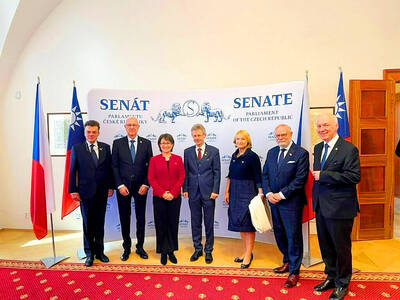Beijing yesterday denied US charges that it forces foreign firms to hand technology over to Chinese rivals as the price of entry to its huge market, saying its policies are in line with global rules.
“Countries around the world have taken a lot of measures to encourage technology innovation,” said a commerce ministry official, who declined to be named. “The Chinese policies are in line with relevant WTO rules.”
The comments were in response to a US Chamber of Commerce report this week that accused China of abusing the allure of its vast market to push foreign companies to transfer their latest technologies to Chinese competitors.
This was a “blueprint for technology theft on a scale the world has never seen before,” the report said.
The chamber’s report is the latest in a chorus of complaints by foreign businesses and governments over perceived unfair policies and market restrictions in the world’s third-largest economy.
US Trade Representative Ron Kirk joined the fray on Wednesday, responding to the chamber’s complaints by saying Washington planned to push Beijing on the issue.
“That is going to be one of the top items that we continue to engage China on,” Kirk told reporters in Washington.
China committed at high-level Sino-US talks in May that its innovation policies would be non-discriminatory, protect foreign intellectual property rights (IPR), and ensure open markets and trade, Washington said.
Beijing also pledged to leave the terms and conditions of technology transfer and other proprietary information to individual firms, Kirk’s deputy, Demetrios Marantis, said earlier this month.
China launched its “indigenous innovation” campaign in 2006, officially to encourage the development of domestic technology and reduce its reliance on foreign know-how.
The ministry official said the push did not discriminate against foreign companies and pledged China would protest IPR.
“China will further strengthen IPR protection, including that of foreign companies, exactly because we encourage homegrown innovation,” he said.
Tensions flared after Beijing issued rules late last year under the innovation campaign that were widely seen by foreign businesses as squeezing them out of the government’s multibillion-dollar procurement market.
Concerns over indigenous innovation extended to security encryption rules, domestic patent laws and preferential policies for domestic companies, the chamber report said.
On Wednesday, the chief engineer of the railways ministry rejected suggestions foreign companies participating in development of high-speed rail in the country had been forced to transfer their technology. China’s high-speed trains were based on foreign technology but it had improved the technology to make the trains even faster, he said.
EU Trade Commissioner Karel De Gucht said during a visit to China last week that European companies were increasingly worried about doing business in China, singling out the technology policy and IPR protections.
Recent surveys by both the European and US chambers of commerce voiced similar concerns, with members saying they were increasingly pessimistic about doing business in China.

Two US House of Representatives committees yesterday condemned China’s attempt to orchestrate a crash involving Vice President Hsiao Bi-khim’s (蕭美琴) car when she visited the Czech Republic last year as vice president-elect. Czech local media in March last year reported that a Chinese diplomat had run a red light while following Hsiao’s car from the airport, and Czech intelligence last week told local media that Chinese diplomats and agents had also planned to stage a demonstrative car collision. Hsiao on Saturday shared a Reuters news report on the incident through her account on social media platform X and wrote: “I

SHIFT PRIORITIES: The US should first help Taiwan respond to actions China is already taking, instead of focusing too heavily on deterring a large-scale invasion, an expert said US Air Force leaders on Thursday voiced concerns about the Chinese People’s Liberation Army’s (PLA) missile capabilities and its development of a “kill web,” and said that the US Department of Defense’s budget request for next year prioritizes bolstering defenses in the Indo-Pacific region due to the increasing threat posed by China. US experts said that a full-scale Chinese invasion of Taiwan is risky and unlikely, with Beijing more likely to pursue coercive tactics such as political warfare or blockades to achieve its goals. Senior air force and US Space Force leaders, including US Secretary of the Air Force Troy Meink and

‘BUILDING PARTNERSHIPS’: The US military’s aim is to continue to make any potential Chinese invasion more difficult than it already is, US General Ronald Clark said The likelihood of China invading Taiwan without contest is “very, very small” because the Taiwan Strait is under constant surveillance by multiple countries, a US general has said. General Ronald Clark, commanding officer of US Army Pacific (USARPAC), the US Army’s largest service component command, made the remarks during a dialogue hosted on Friday by Washington-based think tank the Center for Strategic and International Studies. Asked by the event host what the Chinese military has learned from its US counterpart over the years, Clark said that the first lesson is that the skill and will of US service members are “unmatched.” The second

Czech officials have confirmed that Chinese agents surveilled Vice President Hsiao Bi-khim (蕭美琴) during her visit to Prague in March 2024 and planned a collision with her car as part of an “unprecedented” provocation by Beijing in Europe. Czech Military Intelligence learned that their Chinese counterparts attempted to create conditions to carry out a demonstrative incident involving Hsiao, which “did not go beyond the preparation stage,” agency director Petr Bartovsky told Czech Radio in a report yesterday. In addition, a Chinese diplomat ran a red light to maintain surveillance of the Taiwanese